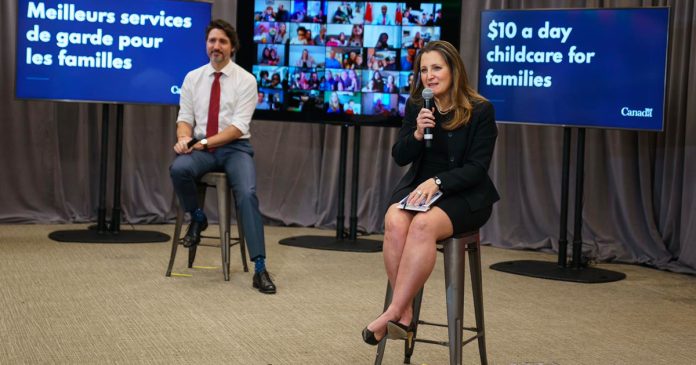The Trudeau government’s unprecedented spending is driving the Bank of Canada’s (BoC) interest rate hikes, according to a report released by the Bank of Montreal’s (BMO) capital markets division.
A BMO Capital Markets’ memo claims that the federal government’s record spending in the form of temporary Covid-19 pandemic benefits and social programs is driving up price inflation.
This has led to the BoC tightening its monetary policy approach by hiking interest rates to levels not seen in decades in an attempt to slow down consumer spending.
Recently, the BoC raised its overnight interest rate to 5.0% in an effort to combat persistent inflation in the services industry, despite the inflation rate dropping to 2.8%.
According to the BMO report, the Trudeau government has increased the government’s spending as a share of GDP, pushing well past the long term average of 15% with a 19% average over the past three years.
Not only has the federal government been growing in size and outspending their means, but provincial governments have also increased their spending as a share of the economy.
BMO estimated that the long-term estimate for combined federal-provincial spending accounted for 37% of the pre-pandemic economy – though this figure has shot up, accounting for 43% of Canada’s GDP in the past three years.
BMO concludes that the extra stimulus both the federal and provincial governments have been providing has contributed to excess consumer demand and thus, price inflation.
BMO economist Douglas Porter said that if the Trudeau government had committed itself to combating inflation to the same degree that the BoC had, then Canada wouldn’t have had to deal with record-high price inflation.
“It didn’t have to be this intense, if fiscal policy had not run so far the other way,” said Porter.
“Overall, while monetary policy has been rowing hard to contain inflation, fiscal policy has been busily paddling in the opposite direction.”
Since taking power in 2015, the Trudeau government has consistently increased the federal government’s spending and deficit, nearly doubling the budget to $605.5 billion in 2020. Since then, spending has decreased, but remain well above the $400 billion mark.
In its latest budget, the Trudeau government ditched its projection to balance the budget within five years, predicting a $40.1 billion deficit. That deficit is expected to drop to $14 billion by 2028.
